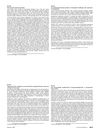Full Investigation of Patients With Polycystic Ovary Syndrome (PCOS) Reveals Significant Differences and Undiagnosed Morbidity
November 2011
in “
Human Fertility
”

TLDR Many women with PCOS have undiagnosed health issues and show different symptoms based on the clinic they visit.
The study, conducted at Leeds General Infirmary, U.K., assessed 70 women with PCOS symptoms from four different specialist clinics and found significant underdiagnosis and differences in clinical presentations. All participants had menstrual problems, with high rates of overweight (81%), polycystic ovaries (86%), hirsutism (56%), acne (53%), acanthosis nigricans (23%), and alopecia (16%). Notably, 38% had undiagnosed impaired glucose tolerance or diabetes. The study revealed that 34% of the women had impaired glucose tolerance, 9% had diabetes, and nearly half had elevated serum triglyceride concentrations. There were also significant differences in ultrasound assessments of ovaries between the infertility and endocrine groups. Despite the small sample size, the findings underscored the need for a multidisciplinary approach to PCOS, with an emphasis on screening for glucose intolerance and diabetes, especially in clinics where these conditions are less commonly reported, such as dermatology.









